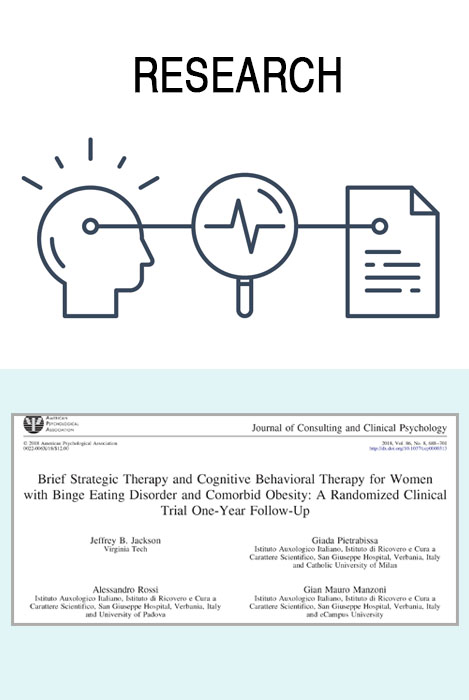BRIEF STRATEGIC THERAPY AND COGNITIVE
BEHAVIORAL THERAPY FOR WOMEN WITH
BINGE EATING DISORDER AND COMORBID OBESITY

Autore:
Jeffrey B. Jackson et al.
Anno:
2018
Editore:
American Psychological Association (APA)
Collana:
Brief Strategic Therapy and Cognitive Behavioral Therapy for Women with Binge Eating Disorder and Comorbid Obesity: A Randomized Clinical Trial One-Year Follow-Up
Abstract
Objective: Binge eating disorder (BED) is frequently linked with obesity and related health risks like cardiovascular disease and diabetes. The purpose of this randomized clinical trial (RCT) was to determine the effectiveness of brief strategic therapy (BST) compared with cognitive-behavioral therapy (CBT) 1 year after a two-phase inpatient and outpatient-telemedicine treatment for BED.
Method: Italian women with BED and comorbid obesity were recruited from a self-referred inpatient treatment program for weight loss (N = 60) and randomly assigned to either the BST treatment condition (N = 30) or CBT treatment condition (N = 30). Inpatient psychotherapy sessions were conducted in person and outpatient telemedicine psychotherapy sessions were conducted over the telephone. Multilevel growth curve modeling was used to estimate average growth trajectories from baseline to 1 year after treatment for the following outcomes: binge eating frequency, weight, and global functioning.
Results: One year after treatment, women in the BST condition decreased in binge eating frequency and women in the CBT condition did not, whereas women in both conditions improved in weight and global functioning. BST was statistically and clinically superior to CBT in improving binge eating frequency, weight, and global functioning.
Conclusions: Examining BED, given the current obesity epidemic, is an important area of study. Findings suggest that BST is statistically and clinically more effective than CBT in treating BED, promoting weight loss, and improving global functioning among women with BED and comorbid obesity 1 year after treatment. Telemedicine may be instrumental in reducing attrition.
Read the full article: https://psycnet.apa.org/fulltext/2018-35470-005.html
